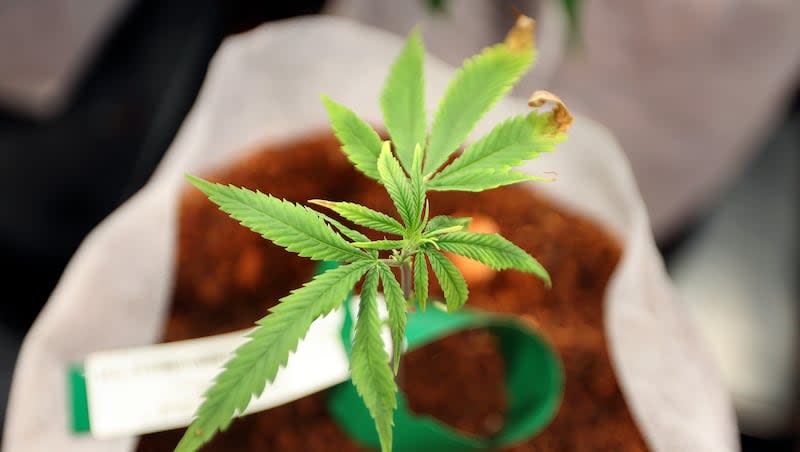DEA proposing to reclassify marijuana

The U.S. Drug Enforcement Administration is proposing to reclassify marijuana as a less harmful drug, though it would not make it legal for recreational use.
The Associated Press reported Tuesday the DEA’s proposal would recognize the medical uses of cannabis and acknowledge it has less potential for abuse than some of the nation’s most dangerous drugs. The White House Office of Management and Budget must still review the plan.
Citing five people familiar with the matter who spoke on the condition of anonymity to discuss the sensitive regulatory review, the AP reported that the move would clear the last significant regulatory hurdle before the DEA’s biggest policy change in more than 50 years could take effect.
Upon OMB approval, the DEA will take public comment on the plan to move marijuana from its current classification as a Schedule I drug, which includes heroin and LSD, to a Schedule III drug, which includes ketamine and some anabolic steroids. After the public comment period and a review by an administrative judge, the agency would eventually publish the final rule.
Last summer, the Department of Health and Human Services recommended that the DEA reclassify cannabis from Schedule I to Schedule III under the Controlled Substances Act. The U.S. Food and Drug Administration also concluded that marijuana should be rescheduled, according to the Congressional Research Service.
The change would have significant implications for medical marijuana users and state medical marijuana programs, including the one in Utah. The move, though, would have fewer implications for state recreational marijuana programs and recreational marijuana users. Currently, 38 states legalized cannabis for medicinal use, while 24 made it legal for recreational use.
What is a Schedule I drug?
Under federal law, a Schedule I drug has no accepted medical use and a high potential for abuse. Drugs in that category include heroin, LSD, ecstasy, peyote and marijuana. Schedule III drugs, such as codeine, ketamine, anabolic steroids and testosterone, have a moderate to low potential for dependence.
In October 2022, President Joe Biden asked the Health and Human Services secretary and the attorney general to review how marijuana is scheduled under federal law. He also moved to pardon thousands of Americans convicted federally of simple possession of marijuana, while calling on governors and local leaders to do the same.
“Criminal records for marijuana use and possession have imposed needless barriers to employment, housing and educational opportunities,” Biden said in December, per AP. “Too many lives have been upended because of our failed approach to marijuana. It’s time that we right these wrongs.”
Federal law still prohibits the possession of any amount of marijuana. Lowering the schedule would allow the use of medical cannabis but does not legalize marijuana. As a Schedule III drug, marijuana would remain regulated by the DEA, meaning the roughly 15,000 cannabis dispensaries in the U.S. would have to register with the DEA like regular pharmacies and meet strict reporting requirements.
Researchers, though, would face fewer restrictions if marijuana is rescheduled, which might lead to further studies.
Is marijuana legal in Utah?
Utah legalized medical cannabis in 2018. The first state-licensed pharmacy opened in March 2020. There are now at least a dozen cannabis pharmacies in the state, mostly along the Wasatch Front. Eight marijuana farms supply facilities manufacture, package and label cannabis products.
In Utah, all cannabis sold as medicine must be grown and processed in the state. All plants and products must be tested using random samples selected by the inspectors at the independent or state-run lab. Utah is unique in that the testing labs are not tied to the companies that sell the product.
As of last September, there were 72,296 medical cannabis card holders with active status in the state — an increase of 27% over the previous year, according to the Utah Department of Health and Human Services. The state has registered 964 qualified medical providers who can prescribe cannabis, a 13% increase from the year before. Those numbers change monthly as people join or drop out of the program. The most recent data in March showed 83,421 patients and 950 qualified providers.
Arguments for and against
Some argue the DEA rescheduling isn’t necessary and could lead to harmful side effects.
Jack Riley, a former deputy administrator of the DEA, said he had concerns about the proposed change because he thinks marijuana remains a possible “gateway drug,” one that may lead to the use of other drugs.
“But in terms of us getting clear to use our resources to combat other major drugs, that’s a positive,” Riley told AP, noting that fentanyl alone accounts for more than 100,000 deaths in the U.S. a year.
Utah GOP Sen. Mitt Romney and other Republican senators raised concerns in March about a recommendation from the Biden administration to reschedule marijuana from a drug seen as having no accepted medical use and a high potential for abuse to one considered low risk for dependence.
“Any effort to reschedule marijuana must be based on proven facts and scientific evidence — not the favored policy of a particular administration — and account for our treaty obligations,” the senators wrote, citing the DEA’s duty to ensure compliance with the Single Convention on Narcotic Drugs, ratified by the Senate in 1967.
Marijuana is controlled under the treaty, the letter points out, “which is not surprising given its known dangers and health risks — and the United Nation’s International Narcotics Control Board (INCB) has fiercely criticized efforts to legalize marijuana in other countries as a violation of the treaty.”
Last week, 21 Democrats led by Senate Majority Leader Sen. Chuck Schumer, D-N.Y., sent a letter to DEA Administrator Anne Milgram and Attorney General Merrick Garland saying marijuana should be removed from the controlled-substances list and instead be regulated like alcohol.
“It is time for the DEA to act,” the lawmakers wrote. “Right now, the administration has the opportunity to resolve more than 50 years of failed, racially discriminatory marijuana policy.”

